13 高中非限制性定语从句
高中非限定性定语从句

高中英语教研组(高一英语)Module5.2教师:杨老师时间:2013-4定语从句知识拓展一.非限制性定语从句1. 限制性定语从句:从句与主句关系密切,去掉从句,主句意义不完整,甚至不合逻辑。
I was the only person in our office who was invited.2. 非限制性定语从句:从句对先行词关系不密切,去掉定从句,意思仍然完整。
形式上用逗号隔开,不能that用引导。
China, which was founded in 1949, is becoming more and more powerful.As is announced in today's papers, all the schools will reopen on September 1st.Tom’s father, who is over sixty, still works hard day and night.The spring festival is an important holiday, when family members get together.She is going to live in Beijing, where she has some close friends.3. 用which而不用that的情况:①引导非限制性定语从句;②代表整个主句的意思;③介词+ 关系代词。
He had failed in the maths exam, which made his father very angry.This is the room in which my father lived last year.4. as引导非限制性定语从句既可放在主句之前,也可放在主句之后,用来修饰整个句子。
通常用下列句型:as is known to all, as is said, as is reported, as is announced, as we all know, as I expect 等。
非限制性定语从句用法归纳
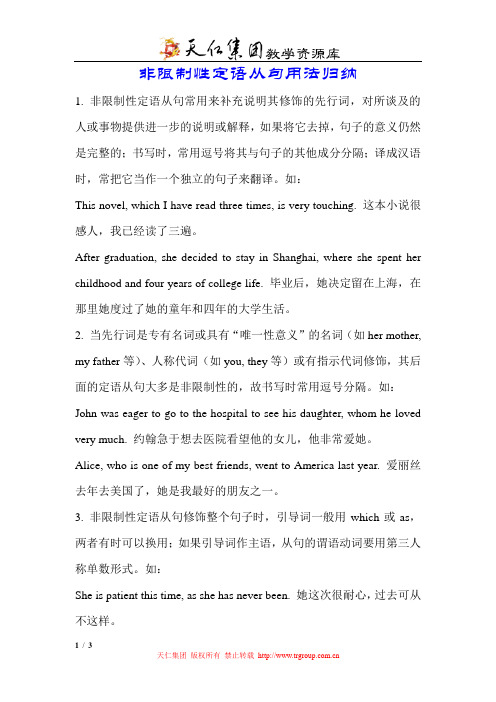
非限制性定语从句用法归纳1. 非限制性定语从句常用来补充说明其修饰的先行词,对所谈及的人或事物提供进一步的说明或解释,如果将它去掉,句子的意义仍然是完整的;书写时,常用逗号将其与句子的其他成分分隔;译成汉语时,常把它当作一个独立的句子来翻译。
如:This novel, which I have read three times, is very touching. 这本小说很感人,我已经读了三遍。
After graduation, she decided to stay in Shanghai, where she spent her childhood and four years of college life. 毕业后,她决定留在上海,在那里她度过了她的童年和四年的大学生活。
2. 当先行词是专有名词或具有“唯一性意义”的名词(如her mother, my father等)、人称代词(如you, they等)或有指示代词修饰,其后面的定语从句大多是非限制性的,故书写时常用逗号分隔。
如:John was eager to go to the hospital to see his daughter, whom he loved very much. 约翰急于想去医院看望他的女儿,他非常爱她。
Alice, who is one of my best friends, went to America last year. 爱丽丝去年去美国了,她是我最好的朋友之一。
3. 非限制性定语从句修饰整个句子时,引导词一般用which或as,两者有时可以换用;如果引导词作主语,从句的谓语动词要用第三人称单数形式。
如:She is patient this time, as she has never been. 她这次很耐心,过去可从不这样。
Yellow Stone National Park, which is in Wyoming, is one of the most beautiful national parks in the world. 黄石国家公园位于怀俄明州,是世界上最美丽的国家公园之一。
非限制性定语从句

games and songs. 6. He is absorbed in work, ____he often was.
hometown,will open next year. 3. We shouldn’t spent our money testing so many people, most of
_____are healthy 4. Chan’s restaurant on Baker Street, ____used to be poorly run, is now
(2)Xi’an, which we visited last year, is really a beautiful city.
(3) My favorite season is autumn, when we celebrate the Mid-Autumn
Festival.
2. 在限制性定语从句中,作宾语的关系代词可以省略,但在非限制性 定语从句中,作宾语的关系代词不能省略。如:
(1)His father, who is a famous actor, will go to Canada next week.
(2)I was born in Beijing, which is the capital of China. 2. 当先行词被指示代词、形容词或物主代词修饰时,要用非限制性定 语从句。如:
练习: 1. His movies won several awards at the film festival, _____was beyond
高中英语非限制定语从句

非限制定语从句
定语从句分为限制性定语和非限制性定语从句,非限制性定语从句在句中主要起补充说明作用,与主句之间往往有逗号隔开,独立存在,确实也不会影响整个句子的意思。
1.who引导的非限制性定语从句
who引导的非限定性定语从句在句中作从句的主语。
eg. Our guide,who was a French Canadian,was an excellent cook.
2. whom引导的非限制性定语从句
关系代词whom用于指人,在句中作动词宾语和介词宾语,作介词宾语时,介词可位于句末。
eg.Peter, whom you met in London, is now back in Paris.
3.whose引导的非限制性定语从句
whose是关系代词who的所有格形式,在从句中作定语。
whose通常指人,也可指动物或无生命的事物。
eg.The boy, whose hat is red, studies very hard.
4.when引导的非限制性定语从句
关系副词when在非限制性定语从句中作时间状语,指代主句中表示时间的词语。
eg.He will come here yesterday, when he will be free.
5.where引导的非限制性定语从句关系
副词where在非限制性定语从句中作地点状语,指代主句中表示地点的词语。
eg.They went back to London,where was their hometown.。
【高中英语】非限制性定语从句

【导语】即⾮限定性定语从句,起补充说明作⽤,缺少也不会影响全句的理解,在⾮限定性定语从句的前⾯往往有逗号隔开,如若将⾮限定性定语从句放在句⼦中间,其前后都需要⽤逗号隔开。
由as, which 引导的⾮限定性定语从句,as和which 可代整个主句,相当于and this或and that。
As⼀般放在句⾸,which在句中。
以下内容由整理发布,欢迎阅读参考!更多相关讯息请关注!使⽤规则及注意事项:1、which引导的⾮限定性定语从句是⽤来说明前⾯整个句⼦的情况或主句的某⼀部分。
2、as有时也可⽤作关系代词。
as引导⾮限制性定语从句,若as在从句中作主语,其引导的句⼦可以放在句⾸,也可以放在句中。
但which引导的⾮限制性定语从句只能放句中。
例句:As is reported in the newspaper, some artistic treasures (艺术珍品) will be on show at the exhibition on the weekend.3、在⾮限定性定语从句中,关系词不能⽤that。
限制性定语从句和⾮限制性定语从句有四⼤区别:1在句中作⽤不同限制性定语从句对被修饰的先⾏词有限定制约作⽤,使该词的含义更具体,更明确。
限制性定语从句不能被省略,否则句意就不完整。
⾮限制性定语从句与先⾏词关系不⼗分密切,只是对其作⼀些附加说明,不起限定制约作⽤。
如果将⾮限制性定语从句省去,主句的意义仍然完整。
2外在表现形式不同限制性定语从句因与先⾏词关系密切,所以不可以⽤逗号将其与主句隔开;⽽⾮限制性定语从句与先⾏词关系不⼗分密切,所以可⽤逗号将其与主句隔开。
例1.Do you remember the girl who taught us English?你还记得教我们英语的那个⼥孩吗?例2.Clock is a kind of instrument which can tell people time.钟是⼀种能够告诉⼈们时间的仪器。
什么是非限制性定语从句

什么是非限制性定语从句定语从句有限制性和非限制性两种。
限制性定语从句是先行词不可缺少的部分,去掉它主句意思往往不明确;非限制性定语从句是先行词的附加说明,去掉了也不会影响主句的意思,它与主句之间通常用逗号分开,将非限定性定语从句放在句子中间,其前后都需要用逗号隔开。
非限制性定语从句可以简单理解为就是没有紧跟在修饰对象(即先行词)之后的定语从句,与限制性定语从句刚好相反。
也就是说,先行词和非限制性定语从句之间常被逗号或是其它语句部分隔开,而没有紧密连接在一起。
需要注意的是:1)引导词that(关系代词)和why(关系副词)一般不用于引导非限制性定语从句。
2)引导词which(关系代词)在引导非限制性定语从句时,不仅可以指代主句的某部分内容,还可以用来指代整个主句。
具体示例如下:(下划线部分是非限制性定语从句;加粗字体是该定语从句的修饰对象,也就是先行词。
)例1:I am looking for a watch, which Jason bought me.例2:The puppy peed in his arms, which made us laugh.例3:Penny, who used to be a waitress, becomes a successful saleswoman.例4:Many people witnessed the accident, some of whom called the police.例5:Jacob is the silent boy standing in the back, whose hair is black and straight.例6:He realized the days were all over when they could talk everything to each other.例7:She wandered in the school alone and aimlessly, where they last met.值得注意的是,由于定语从句的本质是形容词,通常只起到修饰作用,所以定语从句本身一般不会对主句的完整性产生任何影响。
非限制性定语从句

非限制性定语从句1. 定义非限制性定语从句(Non-restrictive Relative Clauses)是指用来修饰一个名词或代词,且不对其进行限定的定语从句。
这种从句通常提供一些额外信息,而不是对名词或代词进行修饰、定义或区分。
非限制性定语从句和限制性定语从句的区别在于非限制性定语从句用逗号或破折号将其与主句分隔开来,而限制性定语从句则不用分隔符。
例如:•限制性定语从句:The book that I borrowed last week was very interesting.•非限制性定语从句:My friend, who is a doctor, came to visit me.非限制性定语从句通常用来提供额外的信息,使得整个句子更加丰富和具体。
2. 结构非限制性定语从句的结构相对简单,通常由关系副词(如where, when, why)或关系代词(如who, whom, which)引导,并且使用逗号或破折号将其与主句分隔开来。
以下是一些常见的关系代词和关系副词:•关系代词:who, whom, whose, which, that•关系副词:where, when, why例如:•关系代词引导的非限制性定语从句:My brother, who is a teacher, lives in London.•关系副词引导的非限制性定语从句:I still remember the day, when we went to the beach.3. 示例以下是一些示例,以帮助读者更好地理解非限制性定语从句的用法和作用。
1.This is my father, who is an engineer.2.The house, which was built in the 19th century, is now a museum.3.She loves music, which is why she plays the piano every day.4.The dog, whose tail is wagging, seems very happy.5.Tom finally got the job, which he had been dreaming of.4. 注意事项在使用非限制性定语从句时,需要注意以下几点:•逗号或破折号:非限制性定语从句通常使用逗号或破折号与主句分隔开来,这有助于读者更好地理解句子的结构和意思。
高考英语语法复习之限制性定语从句和非限制性定语讲义
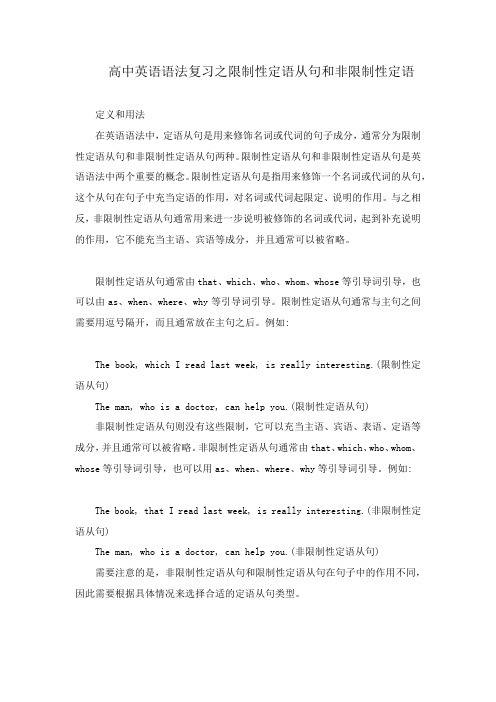
高中英语语法复习之限制性定语从句和非限制性定语定义和用法在英语语法中,定语从句是用来修饰名词或代词的句子成分,通常分为限制性定语从句和非限制性定语从句两种。
限制性定语从句和非限制性定语从句是英语语法中两个重要的概念。
限制性定语从句是指用来修饰一个名词或代词的从句,这个从句在句子中充当定语的作用,对名词或代词起限定、说明的作用。
与之相反,非限制性定语从句通常用来进一步说明被修饰的名词或代词,起到补充说明的作用,它不能充当主语、宾语等成分,并且通常可以被省略。
限制性定语从句通常由that、which、who、whom、whose等引导词引导,也可以由as、when、where、why等引导词引导。
限制性定语从句通常与主句之间需要用逗号隔开,而且通常放在主句之后。
例如:The book, which I read last week, is really interesting.(限制性定语从句)The man, who is a doctor, can help you.(限制性定语从句)非限制性定语从句则没有这些限制,它可以充当主语、宾语、表语、定语等成分,并且通常可以被省略。
非限制性定语从句通常由that、which、who、whom、whose等引导词引导,也可以用as、when、where、why等引导词引导。
例如:The book, that I read last week, is really interesting.(非限制性定语从句)The man, who is a doctor, can help you.(非限制性定语从句)需要注意的是,非限制性定语从句和限制性定语从句在句子中的作用不同,因此需要根据具体情况来选择合适的定语从句类型。
限制性定语从句是先行词在定语从句中充当主语或宾语,对先行词起修饰和限制作用,二者缺一不可。
限制性定语从句和非限制性定语从句是英语语法中的两个重要概念。
高中语法精讲非限制性定语从句的修饰与分隔

高中语法精讲非限制性定语从句的修饰与分隔在高中语法学习中,非限制性定语从句是一个相对较难的知识点。
理解和运用非限制性定语从句对于学生来说是非常重要的,因此,本文将详细介绍非限制性定语从句的修饰与分隔。
希望通过本文的阐述,能够帮助高中生们更好地掌握和运用非限制性定语从句。
一、非限制性定语从句的定义与作用非限制性定语从句是指在一个句子中使用的被修饰的词或短语,其作用是为了对主句中的名词或代词进行补充或说明,同时不对主句的语义造成影响。
例如:My brother, who is a doctor, works at a hospital.(我的弟弟是个医生,在一家医院工作。
)在这个例子中,非限制性定语从句“who is a doctor”修饰了名词“brother”,进一步解释了他的职业,“who is a doctor”这个修饰成分并不是主句中必需的,如果去掉这个从句,主句的意思并不会改变。
二、非限制性定语从句的结构与标点符号非限制性定语从句通常由关系代词或关系副词引导,如:who, whom, whose, which, that, when, where等。
在结构上,它与限制性定语从句不同,它的从句在句子中起到补充说明的作用。
此外,非限制性定语从句前后都要使用逗号进行分隔。
例如:John, who is my best friend, is coming to visit me tomorrow.(约翰,我的最好朋友,明天要来看我。
)在这个例子中,非限制性定语从句“who is my best friend”修饰了名词“John”,并通过逗号与主句分隔开来。
三、非限制性定语从句的注意事项1. 非限制性定语从句通常用来对先行词进行进一步的补充说明,因此,一般不使用“that”作为引导词。
但在口语中,为了避免重复,人们有时会使用“that”。
2. 如果修饰的内容是某物,而不是某人,则要用“which”作为引导词。
(完整版)高中英语非限定性定语从句语法归纳
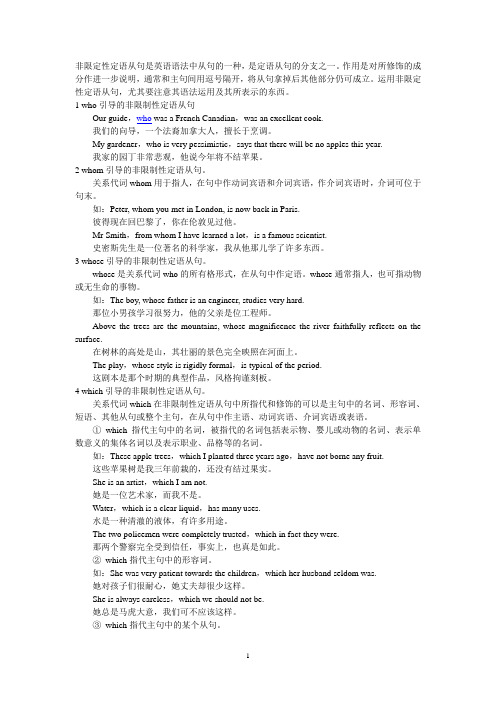
非限定性定语从句是英语语法中从句的一种,是定语从句的分支之一。
作用是对所修饰的成分作进一步说明,通常和主句间用逗号隔开,将从句拿掉后其他部分仍可成立。
运用非限定性定语从句,尤其要注意其语法运用及其所表示的东西。
1 who引导的非限制性定语从句Our guide,who was a French Canadian,was an excellent cook.我们的向导,一个法裔加拿大人,擅长于烹调。
My gardener,who is very pessimistic,says that there will be no apples this year.我家的园丁非常悲观,他说今年将不结苹果。
2 whom引导的非限制性定语从句。
关系代词whom用于指人,在句中作动词宾语和介词宾语,作介词宾语时,介词可位于句末。
如:Peter, whom you met in London, is now back in Paris.彼得现在回巴黎了,你在伦敦见过他。
Mr Smith,from whom I have learned a lot,is a famous scientist.史密斯先生是一位著名的科学家,我从他那儿学了许多东西。
3 whose引导的非限制性定语从句。
whose是关系代词who的所有格形式,在从句中作定语。
whose通常指人,也可指动物或无生命的事物。
如:The boy, whose father is an engineer, studies very hard.那位小男孩学习很努力,他的父亲是位工程师。
Above the trees are the mountains, whose magnificence the river faithfully reflects on the surface.在树林的高处是山,其壮丽的景色完全映照在河面上。
The play,whose style is rigidly formal,is typical of the period.这剧本是那个时期的典型作品,风格拘谨刻板。
常用句型之非限制性定语从句结构

常用句型之非限制性定语从句结构非限制性定语从句是英语中常用的句型结构之一。
它通过添加一个附加信息,来对主句中的某个成分进行进一步解释或补充。
这种句型在写作和口语表达中非常常见,能够丰富语言表达,增加句子的复杂性和合理性。
本文将介绍非限制性定语从句的定义、结构、用法和例句,并总结常用的引导词和注意事项。
通过学习和掌握非限制性定语从句的使用方法,可以帮助提升英语写作和口语表达的能力。
非限制性定语从句的定义及结构非限制性定语从句是对主句中某个成分进行补充说明或解释的句子。
它通常用逗号与主句隔开,不对主句的意思产生限制或改变,只是提供额外的信息。
非限制性定语从句通常由关系代词或关系副词引导,关系代词包括who, whom, whose, which和that,关系副词包括when, where和why。
非限制性定语从句的结构如下所示:主句,+ 逗号 + 关系代词/关系副词 + 从句 + 句号非限制性定语从句的用法和例句1. 对人进行补充说明或解释:My sister, who is a doctor, works in a hospital.我的妹妹是一名医生,她在一家医院工作。
2. 对物进行补充说明或解释:The book, which was written by Mark Twain, is very interesting.这本书是由马克·吐温写的,非常有趣。
3. 对时间进行补充说明或解释:We had a great time on our vacation, when the weather was perfect.我们度假时天气很好,玩得非常开心。
4. 对地点进行补充说明或解释:We visited London, where we saw many famous landmarks.我们访问了伦敦,看到了许多著名的地标。
5. 对原因进行补充说明或解释:She didn't come to the party, which made me upset.她没有来参加派对,这让我很难过。
语法中的非限制性定语从句的构成和特点

语法中的非限制性定语从句的构成和特点非限制性定语从句是英语语法中非常重要的一个概念。
本文将详细介绍非限制性定语从句的构成和特点。
在讨论非限制性定语从句之前,我们首先需要了解定语从句的基本概念。
定语从句是用来修饰名词的从句,起到对名词进行补充或限制的作用。
而非限制性定语从句则与主句之间没有太大的依存关系,多用逗号与主句分开。
非限制性定语从句具有以下几个构成和特点:1. 定语从句的引导词:非限制性定语从句的引导词一般为关系副词"where"、"when"或关系代词"which"、"who"、"whom"、"whose"。
2. 逗号的使用:非限制性定语从句与主句之间需要用逗号隔开,这是为了表示非限制性定语从句与主句的独立性。
在书写时,逗号通常放在非限制性定语从句的前后。
3. 主句与从句的关系:非限制性定语从句与主句之间的关系相对独立,从句提供的信息对于主句的理解并不是必需的。
因此,即使删除非限制性定语从句,主句仍然是完整的句子。
4. 关系词的重复:在非限制性定语从句中,关系代词或关系副词通常会在主句中重复,以消除歧义并帮助读者更好地理解句子的结构和意义。
非限制性定语从句的存在丰富了英语句子的表达方式,可以起到强调、解释或陈述额外信息的作用。
下面是一些示例句子,以帮助读者更好地理解非限制性定语从句的应用。
1. My sister, who is a doctor, lives in New York.我的妹妹,她是一名医生,住在纽约。
2. The concert, which was held last night, was amazing.昨晚举行的音乐会非常精彩。
3. The Eiffel Tower, where thousands of tourists visit every year, is a famous landmark in Paris.埃菲尔铁塔是巴黎的一个著名地标,每年有成千上万的游客来此参观。
高考英语非限制性定语从句

高考英语非限制性定语从句高考英语中,非限制性定语从句是一个重要的考点,也是让很多考生头疼的难点之一。
在写作和阅读理解题中,我们经常会遇到非限制性定语从句的修饰句子,正确使用和理解非限制性定语从句对于学习英语和应对高考有着重要的意义。
非限制性定语从句是指用来修饰一个名词或代词的从句,它对被修饰的词起到进一步解释、补充或者说明的作用,但是不是必须的信息。
与之相对的是限制性定语从句,限制性定语从句提供的信息是必不可少的,去掉它就会改变句子的意思。
在使用非限制性定语从句时,需要注意以下几点:首先,非限制性定语从句通常由关系代词who, whom, whose, which, that, 或关系副词when, where, why引导。
关系代词who, whom, whose分别用来修饰人,which用来修饰事物或抽象概念,that既可以修饰人也可以修饰事物。
关系副词when用来修饰时间,where用来修饰地点,why用来修饰原因。
其次,非限制性定语从句与主句之间使用逗号隔开,与限制性定语从句不同,限制性定语从句与主句之间不使用逗号。
这是非限制性定语从句的一个重要标志,也是考试中常常检查的一个点。
再者,非限制性定语从句的修饰对象通常是整个句子中的一个部分,一般放在句子的末尾,这样可以更好地补充或者解释前面的内容,对于理解整个句子的意思非常重要。
最后,需要注意的是非限制性定语从句与主句之间在语法结构上是并列的关系,它本身并不影响主句的完整性,可以单独存在。
例句:1. My teacher, who is very knowledgeable, always encourages us to pursue our dreams.我的老师非常博学,总是鼓励我们追求梦想。
2. Alice, whose father works in a big company, often tells us interesting stories.爱丽丝的父亲在一家大公司工作,她经常给我们讲有趣的故事。
高中英语:限制性与非限制性定语从句

高中英语:限制性与非限制性定语从句考向一非限制性定语从句非限制性定语从句是对意义已经非常明确的先行词给予补充、说明,删去非限制性定语从句,主句的意思仍是概念清晰、结构完整的。
非限制性定语从句的引导词有w h o,w h o m,w h i c h,w h o s e,a s,w h e n,w h e r e等,t h a t不可用于引导非限制性定语从句,从句之前要用逗号。
先行词指人,则用w h o,w h o s e,w h i c h等;先行词指物,要用w h i c h;先行词表时间或者地点,并在句中作时间状语或者地点状语时要用w h e n或者w h e r e引导。
一、使用非限制性定语从句的情况:1.关系代词指代整个主句时,使用非限制性定语从句。
☛Y o u d i d a l o t f o r m e,f o r w h i c h I w a s g r a t e f u l.你为我做了许多,对此我很感激。
☛T h e D i a o y u I s l a n d b e l o n g s t o C h i n a,a s i s k n o w n t o u s.众所周知,钓鱼岛属于中国。
☛A m i d d l e-a g e d w o m a n k i l l e d h e r h u s b a n d, w h i c h f r i g h t e n e d m e v e r y m u c h.一个中年女子杀害了自己的丈夫,这令我十分恐惧。
2.当先行词指的是世界上独一无二的事物或人名地名等专有名词时,使用非限制性定语从句。
☛C h i n a,w h i c h i s m y m o t h e r l a n d,i s d e v e l o p i n g f a s t.中国是我的祖国,正在快速发展。
☛E a s o n,w h o w a s a p o p s t a r,g o t m a r r i e d l a s t y e a r.伊森去年结婚了,他是明星。
高中语法精讲非限制性定语从句的特点
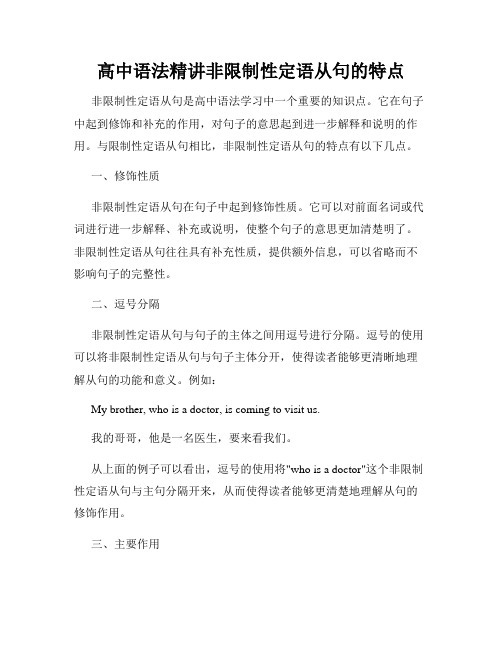
高中语法精讲非限制性定语从句的特点非限制性定语从句是高中语法学习中一个重要的知识点。
它在句子中起到修饰和补充的作用,对句子的意思起到进一步解释和说明的作用。
与限制性定语从句相比,非限制性定语从句的特点有以下几点。
一、修饰性质非限制性定语从句在句子中起到修饰性质。
它可以对前面名词或代词进行进一步解释、补充或说明,使整个句子的意思更加清楚明了。
非限制性定语从句往往具有补充性质,提供额外信息,可以省略而不影响句子的完整性。
二、逗号分隔非限制性定语从句与句子的主体之间用逗号进行分隔。
逗号的使用可以将非限制性定语从句与句子主体分开,使得读者能够更清晰地理解从句的功能和意义。
例如:My brother, who is a doctor, is coming to visit us.我的哥哥,他是一名医生,要来看我们。
从上面的例子可以看出,逗号的使用将"who is a doctor"这个非限制性定语从句与主句分隔开来,从而使得读者能够更清楚地理解从句的修饰作用。
三、主要作用非限制性定语从句的主要作用是修饰和说明名词或代词的身份、性质、特征等,使得句子更加丰富和准确。
它可以提供更多的信息,使句子更具描述力和表达力。
四、从句中的词汇非限制性定语从句中的词汇常常是较为泛泛的描述性词语,如"who"、"which"、"where"等。
这些词汇在从句中充当主语、宾语或定语,起到进一步说明和修饰名词或代词的作用。
例如:John, who is my best friend, is coming to visit me.约翰,我的最好朋友,要来看我。
从上面的例子可以看出,非限制性定语从句中的"who"在从句中起到修饰主语的作用,并进一步解释了约翰的身份和关系。
五、从句中的动词形式非限制性定语从句中的动词形式一般采用完整的谓语结构,包括谓语动词和其他补充性成分。
非限制性定语从句的特点

非限制性定语从句的特点非限制性定语从句是英语中一个常见的语法结构,用来给予额外信息或解释主句中的名词或代词。
与限制性定语从句相比,非限制性定语从句在语法和用法上有一些独特的特点。
一、引导词非限制性定语从句通常由引导词“which”引导,有时也会使用“who”、“whom”或“whose”。
与限制性定语从句不同,非限制性定语从句的引导词与主句之间使用逗号隔开。
例如:1. My brother, who is a doctor, lives in New York.2. I love reading books, which broaden my horizons.二、语义补充非限制性定语从句与主句之间具有补充的语义作用,它提供了对主句的进一步解释、描述或评论。
这种补充信息通常是非必要的,它对句子的整体意思没有太大的影响。
例如:1. Amy, who is a talented artist, won the first prize in the art competition.2. John's new car, which is red and luxurious, caught everyone's attention.三、语序和修饰范围非限制性定语从句与限制性定语从句在语序和修饰范围上也存在一些差异。
1. 语序:非限制性定语从句通常使用主语+谓语的语序,不受主句语序的限制。
例如:1. The company, which was founded in 1999, has become a global leader in its industry.2. My best friend, who just moved to London, invited me to visit him.2. 修饰范围:非限制性定语从句可以修饰整个主句,可以放置在主句的开头、中间或结尾。
例如:1. Peter, who has been working hard, finally achieved his goal.2. The book, which was written by a famous author, became a bestseller.四、适用场景非限制性定语从句在书面语和口语中都十分常见。
非限制性定语从句

非限制性定语从句非限制性定语从句,中文语法中常常使用到的一种修饰从句。
它的作用是对主句的某一成分进行进一步的补充说明或者限制。
与限制性定语从句不同的是,非限制性定语从句强调的是对主句内容的附加说明,而不是对其进行限制或者约束。
非限制性定语从句通常用来修饰某一名词、代词或者整个主句,并且常常使用逗号与主句分开。
它可以用来指明人或者事物的特点、属性、背景等信息。
以下是几个例子来阐述非限制性定语从句的应用:1. William Shakespeare, who is considered the greatest playwright in history, wrote many famous plays.(威廉·莎士比亚被认为是历史上最伟大的剧作家,他写了许多著名的戏剧。
)其中的“who is considered the greatest playwright in history”是对“William Shakespeare”进行进一步的补充说明。
2. The sun, which is the center of our solar system, provides light and heat to the Earth.(太阳是我们太阳系的中心,为地球提供光和热。
)这个例子中的“which is the center of our solar system”对“the sun”的属性进行了补充说明。
3. My friend Jane, who is a talented musician, will perform at the concert tonight.(我的朋友简是一位才华横溢的音乐家,她将在今晚的音乐会上表演。
)在这个例子中,非限制性定语从句“who is a talented musician”对“my friend Jane”进行了进一步的描述。
需要注意的是,在非限制性定语从句中,关系词通常可以省略。
高中语法技巧非限制性定语从句的应用
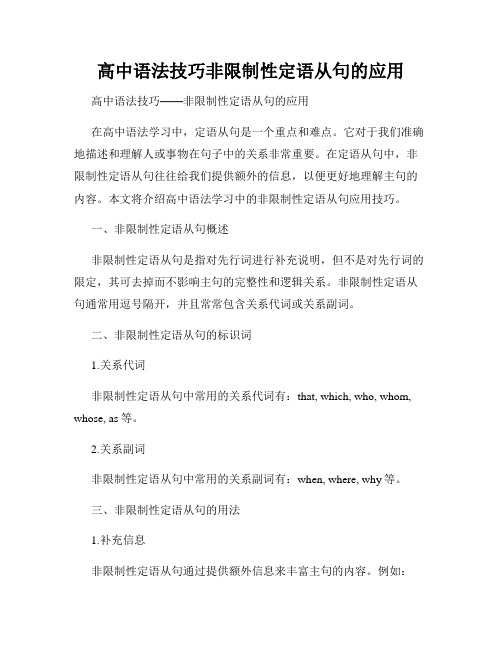
高中语法技巧非限制性定语从句的应用高中语法技巧——非限制性定语从句的应用在高中语法学习中,定语从句是一个重点和难点。
它对于我们准确地描述和理解人或事物在句子中的关系非常重要。
在定语从句中,非限制性定语从句往往给我们提供额外的信息,以便更好地理解主句的内容。
本文将介绍高中语法学习中的非限制性定语从句应用技巧。
一、非限制性定语从句概述非限制性定语从句是指对先行词进行补充说明,但不是对先行词的限定,其可去掉而不影响主句的完整性和逻辑关系。
非限制性定语从句通常用逗号隔开,并且常常包含关系代词或关系副词。
二、非限制性定语从句的标识词1.关系代词非限制性定语从句中常用的关系代词有:that, which, who, whom, whose, as等。
2.关系副词非限制性定语从句中常用的关系副词有:when, where, why等。
三、非限制性定语从句的用法1.补充信息非限制性定语从句通过提供额外信息来丰富主句的内容。
例如:The Great Wall, which is over 13,000 miles long, is a symbol of Chinese civilization.长城,长达13000多英里,是中国文明的象征。
2.插入语非限制性定语从句可以用作插入语,用以提供相关信息。
例如:My sister, who is a doctor, lives in London.我的姐姐,她是一名医生,住在伦敦。
3.限制说明非限制性定语从句有时也可以用来限制说明范围。
例如:All the students, who are not wearing a uniform, should go to the office.所有没有穿制服的学生都应该去办公室。
四、非限制性定语从句与其他从句的区别在非限制性定语从句中,逗号是必不可少的标点符号。
这与其他从句的标点符号有所不同。
例如:The book, which I bought yesterday, is very interesting.这本我昨天买的书非常有趣。
- 1、下载文档前请自行甄别文档内容的完整性,平台不提供额外的编辑、内容补充、找答案等附加服务。
- 2、"仅部分预览"的文档,不可在线预览部分如存在完整性等问题,可反馈申请退款(可完整预览的文档不适用该条件!)。
- 3、如文档侵犯您的权益,请联系客服反馈,我们会尽快为您处理(人工客服工作时间:9:00-18:30)。
非限制性定语从句限制性定语从句与非限制性定语从句的区别:1. 形式上,非限制性定语从句往往用逗号隔开。
2. 语法上,非限制性定语从句一般不用that.3. 语义上,限制性定语从句与先行词关系紧密,起限定作用,如果去掉了这个定语从句,整个句子就不完整或者会改变意思;而非限制性定语从句与先行词关系不是很紧密,对先行词起补充说明或描述的作用。
This is the book I like best.这就是我最喜欢的那本书。
Beijing, which has been China's capital for more than 800 years, is rich in cultural and historic relics.北京是中国八百年之久的古都,它有着丰富的文化和历史遗产。
4. 翻译时,限制性定语从句可译为一句(较短的一般译为"的"字结构);而非限制性定语从句可译为两句。
(见上句翻译)比较He has a sister, who is a musician.He has a sister who is a musician.引导非限制性定语从句的关系代词,指人时用who, whom, whose , 指物时用which , whose; 关系副词when,where, why, etc.1. He studied hard at school when he was young, which leads to his success in his later life.2. Tom's father, who arrived just now, is a famous scientist.单项选择1. The place _______interested me most was the Children's Palace.A. WhichB. whereC. whatD. in which2. Do you know the man _______?A. whom I spokeB. to who spokeC. I spoke toD. that I spoke3. This is the hotel _______last month.A. which they stayedB. at that they stayedC. where they stayed atD. where they stayed4. Do you know the year ______the Chinese Communist Party was founded?A. whichB. thatC. whenD. on which5. That is the day ______I'll never forget.A. whichB. on whichC. in whichD. when6. The factory ______we'll visit next week is not far from here.A. whereB. to whichC. whichD. in which7. Great changes have taken place since then in the factory _______we are working.A. whereB. thatC. whichD. there8. This is one of the best films _______.A. that have been shown this yearB. that have shownC. that has been shown this yearD. that you talked9. Can you lend me the book ______the other day?A. about which you talkedB. which you talkedC. about that you talkedD. that you talked10. The pen ______he is writing is mine.A. with whichB. in whichC. on whichD. by which11.They arrived at a farmhouse, in front of ______sat a small boy.A. whomB. whoC. whichD. that12.The engineer ______my father works is about 50 years old.A. to whomB. on whomC. with whichD. with whom13.It there anyone in your class ______family is in the country?A. whoB. who'sC. whichD. whose14.I'm interested in ______you have said.A. all thatB. all whatC. thatD. which15.I want to use the same dictionary ______was used yesterday.A. whichB. whoC. whatD. as16.He isn't such a man ______he used to be.A. whoB. whomC. thatD. as17.He is good at English, ______we all know.A. thatB. asC. whomD. what18.Li Ming, ______to the concert enjoyed it very much.A. I went withB. with whom I wentC. with who I wentD.I went with him19.I don't like ______ as you read.A. the novelsB. the such novelsC. such novelsD. same novels20.He talked a lot about things and persons ________they remembered in the school.A. whichB. thatC. whomD. what21.The letter is from my sister, ______is working in Beijing.A. whichB. thatC. whomD. who22.In our factory there are 2,000 workers, two thirds of ____are women.A. themB. whichC. whomD. who23.You're the only person ______I've ever met ______could do it.A. who;/B./; whomC. whom;/D./; who24.I lost a book, ______I can't remember now.A. whose titleB. its titleC. the title of itD. the title of thatst summer we visited the West Lake, ______Hangzhou is famous in the world.A. for whichB. for thatC. in whichD. what26.I have bought such a watch _______ was advertised on TV.A. thatB. whichC. asD. it27.I can never forget the day _______ we worked together and the day ______ we spent together.A. when; whichB. which; whenC. what; thatD. on which; when28.The way ______he looks at problems is wrong.A. whichB. whoseC. whatD./29.This is the reason ______he didn't come to the meeting.A. in whichB. with whichC. thatD. for which30.This machine, ______for many years, is still working perfectly.A. after which I have lookedB. which I have looked afterC. that I have looked afterD. I have looked after31.The reason ______he didn't come was ______he was ill.A. why; thatB.that;whyC. for that;thatD.for which;what32.He is working hard, ______will make him pass the final exam.A.thatB.whichC.for whichD.who33.That is not the way ______I do it.A./B.whichC.for whichD.with which34.I have two grammars, ______are of great use.A. all of whichB. either of whichC. both of thatD. both of which35.I want to use the same tools _______used in your factory a few days ago.A. as wasB. which wasC. as wereD. which36.My neigh bours used to give me a hand in time of trouble, _______ was very kind of them.A. whoB. whichC. thatD. it37.This is the magazine _______ I copied the paragraph.A. thatB. whichC. from thatD. from which38.He is not such a man _______ would leave his work half done.A. thatB. whichC. whoD. as39. You can depend on whatever promise _______ he makes.A. /B. whyC. whenD. whose40. Smoking, _______ is a bad habit, is, however, popular.A. thatB. whichC. itD. though41. --- Did you ask the guard _______ happened?--- Yes, he told me all _______ he knew.A. what; thatB. what; whatC. which; whichD. that; that42. I shall never forget those years _______ I lived on the farm withthe farmers, _______ has a great effect on my life.A. when; whoB. that; whichC. which; thatD. when; which43. The number of the people who _______ cars _______ increasing.A. owns; areB. owns; isC. own; isD. own; are44. During the days ________, he worked as a servant at the Browns.A. followedB. followingC. to followD. that followed。
